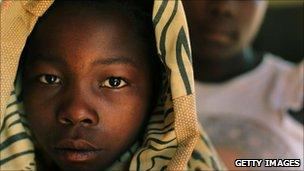Ugandan child soldiers suffer problems similar to NI children
- Published

Psychology students at Queen's University have discovered that the trauma suffered by child soldiers in Uganda and those children caught up in Northern Ireland's violence are similar.
Students from the university's doctoral programme in educational, child and adolescent psychology conducted a study at a school for ex-child soldiers in Uganda.
Mr O'Callaghan said that the research has similarities with that conducted among children in Northern Ireland.
"There are strong parallels in the shifting sense of identity that can occur with children here who may initially have been coerced into joining criminal or paramilitary organisations, but then go on to internalise the values, justifications and methods of these organisations over time," he said.
The researchers analysed the levels of post-traumatic stress disorder (PTSD) among ex-soldiers, explained the symptoms of trauma to the children and offered psychological therapy to the most traumatised.
The children in the school were former abductees of the Lord's Resistance Army, a group notorious for kidnapping children, brutalising them and forcing them to become soldiers and sex slaves.
Over 35,000 children are estimated to have been abducted over the last 24 years.
Paul O'Callaghan, one of the students leading the study, said the students screened 205 children for PTSD, anxiety and depression.
'Traumatic bonding'
"We found that even four years after witnessing traumatic war events, rates of psychological distress were very high, with 58% of the children showing PTSD symptoms and 34% having depression and anxiety," he said.
"The study highlighted a large prevalence of 'traumatic bonding' where children adopt an abuser's views, attitudes and behaviours.
"The study found that over time some of the children began to identify more and more with the values and attitudes of their captors and even began to blame the victims for the violence they were subjected to."
The research found that the most disturbing experience for the child soldiers was not the murders and atrocities that they had witnessed, instead, it was the death of their mothers during the war.
The trauma and psychological distress of those who had lost their mother was much greater than those who had not.
The team at Queen's School of Psychology will continue their work pioneering a treatment for psychological distress among child soldiers in the Democratic Republic of Congo this summer.
Their work is being released in advance of Red Hand Day, a worldwide annual commemoration day on the 12 February to draw attention to the plight of the 250,000 children who are currently forced to serve as soldiers in wars and armed conflicts, and to remember the thousands who have lost their lives as a result.